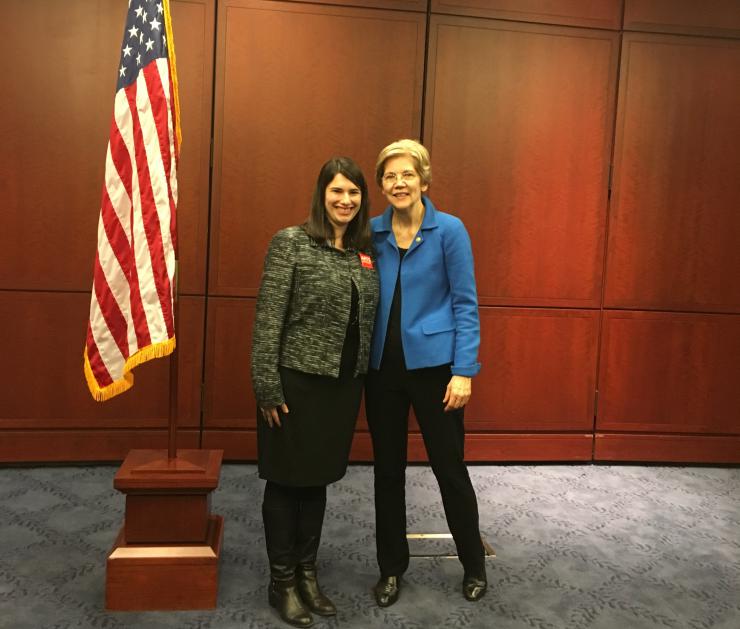The How and the Why of Arts Advocacy
“You can’t spell bipartisan without ART!”
In a crowded Washington, DC ballroom on March 20, I joined hundreds of other arts enthusiasts as we got down to business for the thirtieth annual National Arts Advocacy Day, organized by Americans for the Arts. That morning, a speaker told the first-time attendees something we already knew: DC is incredibly divided right now, so what we were about to do was especially important. The arts cross party lines in this party-line town, and they can bring people together. I was hopeful, but wondered: Is it a bit kumbaya to think that the arts can help our divided Congress—and country—find common ground?
I had signed up for Arts Advocacy Day and flown to DC with great excitement, but also with a good deal of internal conflict. I firmly believe that the arts can build bridges, but lately I’ve been more concerned about other issues that feel immediately pressing: Refugees and immigrants, reproductive rights, access to healthcare, Black Lives Matter, climate change, civil liberties, net neutrality, LGBTQ rights, gun control…just to name a few. With so many other critical matters at stake, why did I feel so compelled to make this extra effort for the arts?
My invigorating experiences in DC and at Arts Matter Advocacy Day in my home state of Massachusetts helped me answer this question. They also provided me with tools that I can apply to advocating for all the issues I care deeply about. I hope anyone reading this can apply them as well.
When we fight for the arts, we’re fighting to enrich our country’s spirits and imaginations.
“If you can’t tell your story in two minutes, then you have a problem.”
The first day in Washington, I spent hours with the other advocates being trained and briefed on how to approach our Congressional meetings the following day. Massachusetts State Senate President and Americans for the Arts Fellow Stan Rosenberg hammered home that we have very little time to make an impression with our Congresspeople and their staffers. Storytelling that hits on an emotional level is essential, and unless it’s brief, they’ll stop paying attention.
In your own advocacy, you can use this great resource from MASSCreative to structure your story about why the arts matter to you—stories about overcoming obstacles are especially compelling. After you speak, it’s important to exercise restraint and wait for them to respond. Don’t fill in the silences with more nervous talk.
I learned it was good to begin conversations by asking my representative or their staff about their arts connection. This primed them to hear what I had to say. Everyone has a relationship to the arts and creative expression, even if it’s just singing showtunes in the shower! Once the conversation was opened in this engaging way, I could launch into my own story and asks.
“What are your top three issues?”
Both the national and state days emphasized being specific about your issues and prepared to talk about them. In DC we received an incredible binder full of briefings on each topic, then as a state delegation we selected what to address and who would take the lead. In Massachusetts, MASSCreative, our state arts advocacy organization, provided clear and concise handouts on the three most critical arts needs for the Commonwealth.
Whatever your three issues, think about relevance and sequencing (i.e., adding arts education as a requirement this year will lead to higher test scores next year). Also, look at the political reality: are you asking for a policy change or a budget change? And it’s crucial to bring up specific issues to lawmakers based on the committees they sit on.
“Data + stories = impact”
Politicians love their data, and lucky for us, the arts have got some pretty good numbers. Here are a few of my favorite statistics that can help shut down any of those “why should we spend money?” and “but do people really want it?” or “but isn’t STEM more important right now?” questions:
- The NEA tax breakdown in 2017 is 47 cents/person. But in 1992, it was 68 cents/person. Furthermore, fifty-five percent of Americans approve of increasing federal arts grants to $1/capita.
- Eighty-eight percent of the public believes that the arts are part of a well-rounded education.
- If the arts and culture sector were a state, in 2014 it would have had a higher GDP than 45 other states.
- Scientist Nobel Laureates are seventeen times (!) more likely to be involved with the arts than other scientists. In fact, when 2013 Nobel Prize for Medicine recipient Thomas C. Südhof learned about the award, he said, “I owe it all to my bassoon teacher.” Just a small story to go with that piece of data to have a greater impact on the listener.
“Without art, there is no empathy. Without empathy, there is no justice.”
Following a long day of preparing to hit Capitol Hill, I was worn out. But that evening, Darren Walker, President of the Ford Foundation, delivered words that gave our training a heart and soul, revving everyone up to go to the hill the following day. His address fed me spiritually.
He told his own story, passionately argued for the necessity of federal funding, refuted common arguments with panache and ease, reflected on our moment and our own limitations, and energized everyone in attendance. He made the case that because the arts create empathy, investing in them means investing in humanity. You can read his speech here, which illustrates the power of personalization, driving home the message of why the arts are so crucial. I left feeling a deeper sense of purpose about why I was there.

“Let us know how it affects our district.”
My day on Capitol Hill featured meetings with five different lawmakers’ staff—an exhausting and exhilarating experience. Massachusetts is fortunate to have Congresspeople already supportive of the arts, so our delegation had a different approach than many others. We began by thanking them for their continued support (always thank people first if they have a good track record!), and asked how we could help them become even more vocal supporters. This provided the staffers with a chance to think out loud, and made it a real conversation.
These staffers repeatedly told us to send them data and stories about specifics from their home district. Those are what they bring to their Congresspeople. So, they said, if you have such a story, write an email or send a news article. And given the current makeup of Congress, the only other help we could give is leveraging our national networks: since our representatives were allies of the arts, we were encouraged to reach out to those whose representatives are not, and find out how we can help them.
The staffers emphasized that they are feeling the challenge of responding to and prioritizing everything. Their general anxiety was palpable. These staffers don’t have the option of turning off the news and taking a breather, the way many of us can. If you are in the habit of thanking your Representatives or Senators, consider thanking these hardworking, stressed-out staffers as well.
“Remind people that taxes are a good thing.”
Unlike my day running around the Congressional offices in DC for quick meetings, my Massachusetts arts advocacy had much more depth. I had been a fan of my own State Representative, Denise Provost, ever since she personally responded to a form email I sent her several years ago. She was incredibly generous with our group, spending nearly forty-five minutes reflecting on her own creative experiences and passions, listening to our concerns and stories, and engaging us in dialogue.
When we asked Representative Provost how we could help her as one of our vocal arts advocates, her response startled me a bit. “Remind people that taxes are a good thing,” she said, explaining how taxes work in our state and why it is so difficult to increase arts funding without them. I left our meeting ruminating on how the money for a budget increase for the arts has to come from somewhere.
“This is a marathon, not a sprint.”
Your success with these lawmakers depends on how they view you: that’s why it’s vital to maintain a respectful tone no matter what. If you wait until you need help, it may be too late. But if you can build a professional, trusting relationship with key decision makers, they may come to value your opinions and seek your advice. This is a long game. It’s about persistence, not resistance.
And in case you’ve ever doubted it, those mass email petitions do, in fact, matter. We have folks at Americans for the Arts (and in Massachusetts, at MASSCreative) who know when the opportunity and timing align to warrant a barrage of constituent messages. Sometimes, you can use these form communications to build your relationship with your representatives. A few weeks after our state day, the proposed budget for the Massachusetts Cultural Council was cut by 28 percent, from $14 million to $10 million. When I emailed Representative Provost the form email from MASSCreative, I added a simple, “It was lovely to meet you in person during Arts Matter Day a few weeks ago.” Her response led to a personal email exchange, and now I feel like I can reach out about other issues in a more personal way.
As I came to the end of this whirlwind week of arts advocacy, I found myself thinking about the meaning of being progressive. It means playing the long game because it’s about progress. Change won’t happen immediately. It involves shifting the opinions of those who disagree with you, as well as convincing those who were too apathetic to care.
As Darren Walker reminded me, even with everything else falling apart right now, it is worth it to fight this fight. When we fight for the arts, we’re fighting to enrich our country’s spirits and imaginations. We need that in order to persist and resist for everything that matters.


Comments
The article is just the start of the conversation—we want to know what you think about this subject, too! HowlRound is a space for knowledge-sharing, and we welcome spirited, thoughtful, and on-topic dialogue. Find our full comments policy here
Thanks for this article, and the fun facts about the arts...I especially like the Scientist Nobel winner one...it is great that folks are looking to participate in the civil aspects of our social obligations as artists...
But, being from The Living Theatre, I have to say that while it is progress that many artists are finally participating and learning how to participate in government...I think that at this time more than any, those of us in the arts should be pushing for the most radical changes to our system of organization as a society.
I am not into the partisan politics, and according to basic polls, neither are most 'Americans'...and I find it confusing to see so many artists in this time of political unrest, to be jumping so quickly into the system that is so clearly failing us.
If now isn't a time for major structural changes in our government, or time to start thinking beyond government as a form of organization...and if artists aren't going to initiate it...then when will be the time and who will do it?
Not to be a downer, but to me, our level of participation, especially on the left (though I know less and less what that means), especially in the arts where most identify as left in my experience...well, it seems to me to be like taking tips on creating buoyancy on an already sinking ship...
This was super interesting - and applicable to artist activists in more ways than one!
Just the uplift I needed to read.
Thank you for reminding us of a critical and almost forgotten voice in democracy: the arts.